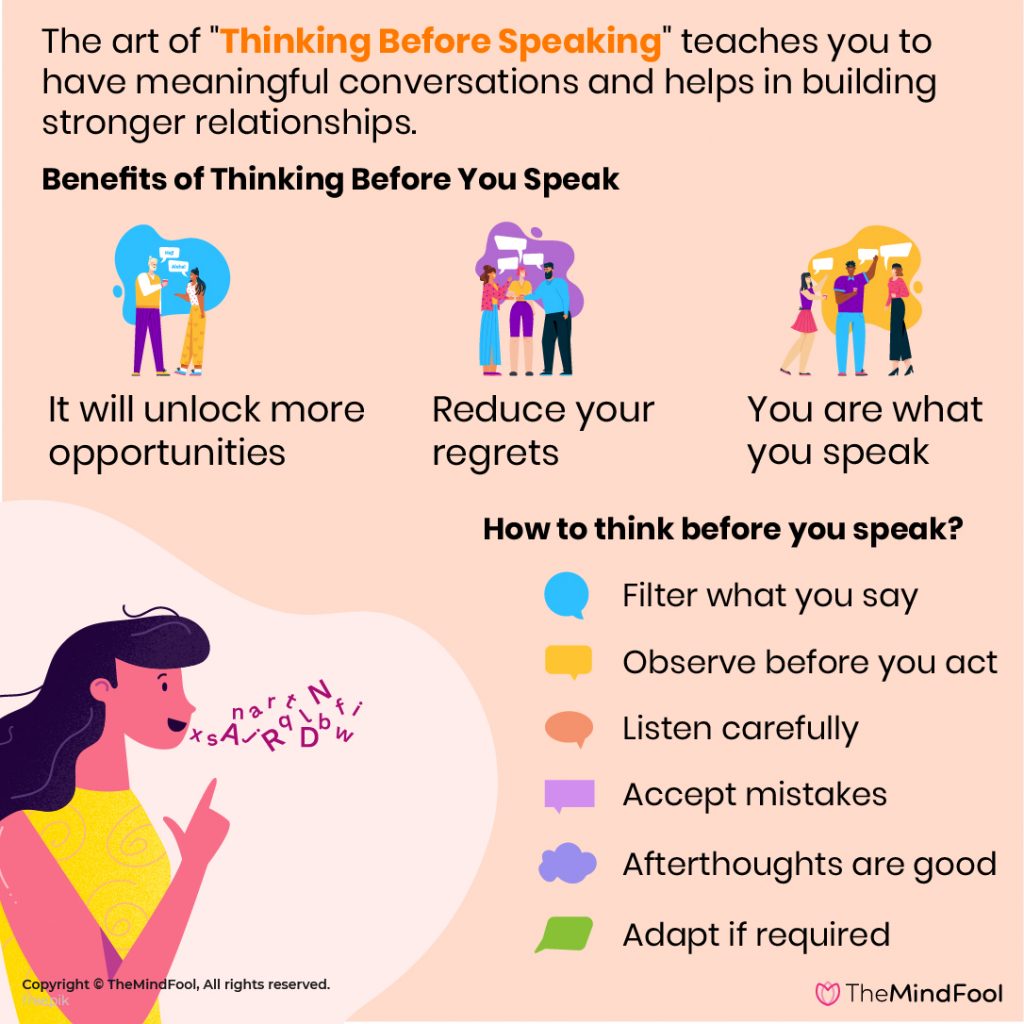
Often situations in life lead us to believe that if actions speak louder than words, why bother to think before you speak, isn’t it? This does not seem odd, at least initially. But the minute you encounter a situation in which the person on the other side does not intend to do what he or she says, the realization happens.
Ask yourself, what respect would you have for a person who does not mean what he/she says? The answer to this question will make you realize the importance of the ‘think before you speak’ philosophy in your life. Irrespective of being in a personal or a professional scenario, it is important to be represented correctly even through your speech.
There must have been many instances in your life when you have just blurted out words from your mouth and what follows is a sheer embarrassment. Of course, this happens because you do not pay attention to your thoughts before you speak.
Unfortunately, the only option in such situations is to apologize profusely in anticipation that the person on the other side will eventually forget. But do not give up hope, with a little bit of practice, you can actually teach yourself to think before you speak. All it takes is a little bit of patience!
Summary in Infographics

Benefits of Thinking Before You Speak
SUMMARY
The art of thinking before speaking teaches you to have meaningful conversations thus building stronger relationships.
So, you blurted out something you do not intend to do? What’s the big deal? Why does opening your mouth matter so much? If this is what you believe, you need a reality check. It is important to mean what you say and say what you mean. In fact, this is one of the first rules to be respected in any relationship-personal or professional.
The next time you are itching to start a conversation, stop and think about what you intend to say. This will barely take a few seconds but the result will be a far more impactful and meaningful conversation.
Now, let us take a look at why you actually need to practice the ‘think before you speak’ philosophy:
1. It Will Unlock More Opportunities

Have you ever missed an opportunity just because you said something that made others think that you were not fit for the job? I am sure most of us would have faced this problem at some point in our life, particularly in our careers. But, had you chosen to think and speak, the conversation would have been more effective.
Needless to say, the result could have been favorable. This is applicable to something as simple as a high school interaction. Therefore, take the cue and remember that if you intend to make the most of every opportunity that presents itself, you must learn to think before you speak. An interesting article that evaluates the findings of Harvard Business Review also highlights the importance of communicating correctly.
TIP
If you think before you speak, you will be able to strategize your approach and achieve good results.
2. Reduce Your Regrets

When you regret what you say, it is actually a set back in the conversation. After all, words hurt the heart even when harming is not the intent. You regret it later. This regret grows into guilt and soon enough it starts corrupting the positive thoughts within you.
However, if you invest in some thinking before you speak, this regret can be avoided. Additionally, today we have access to social media where you can share your thoughts with the world almost instantly. This makes it even more important to carefully think it through.
3. You Are What You Speak

The connection between our thoughts and speech goes deeper than just shaping our intent. In fact, according to research, what we speak is deeply connected to shaping our personality. You should say what you mean!
For instance, if you are regularly using abusive language or speaking harsh/bitter words, your subconscious nudges you to start behaving accordingly. Unfortunately, the result of this gradual nudging is only revealed when the damage is done.
4. Handle challenging conversations
Thoughts are closely linked to our use of vocabulary. The secret to handling challenging conversations lies in carefully evaluating every aspect of your speech. All you need to do is choose your words wisely. You would be surprised to know that words have power, immense power!
5. Uplifting words
You can uplift spirits based on the sense that you convey through your conversation. Just remember that you need to invest thought in your speech.
6. Know what you are reacting to
This is one of the big advantages of opting to think before you speak is that you become conscious of what you are reacting to.
7. First impressions
Your conversation is important because it is how people will remember you. Therefore, thinking before speaking ensures that your first impressions are truly impressive.
8. Observation skills
Think before you act and this will help you strengthen your observation skills. Your mind would be attuned to carefully observing every detail before giving an opinion.
9. Analytical thinking
This habit helps you build your analytical thinking skills as well. It focuses on evaluating possible scenarios before you form an opinion.
10. Wellness
A clear and organised thought process is one of the first steps to ensuring the overall wellness of the heart and mind. This includes your mental health as well.
11. Stronger resilience
Over a period of time, thinking before speaking sharpens your skills and ensures that you have a better capability to cope with problems.
12. More respected
If you talk sense, people are likely to respect you more. They will be more forthcoming with their ideas and such interactions lead to innovations.
How to think before you speak?
To think before you speak will help you develop stronger and meaningful relationships with people around you. It is a simple yet extremely important skill that can contribute to a healthy and happy lifestyle. After all, clear conversations lay the foundation for a strong relationship. Unfortunately, a lot of us lose out on the benefits of a good relationship, simply because we do not follow this philosophy.
In the section that follows, we share a few simple tips on how one can learn to think before speaking. This is not as complex as it sounds, just a few changes in your attitude can help achieve it.
1. Filter what you say

A lot of your troubles will fade away once you teach the mind to spare some though before you utter the words from your mouth. Try to put in place a basic process that will evaluate your thoughts before you make a conversation. In simple terms, share thoughts that matter with people that matter.
2. Observe before you act

Not every matter requires your opinion. Also, remember that you are privileged to be able to share an opinion. So, make it a point to observe the situation before you voice an opinion. You must be sure about all aspects and only then form an opinion. This will ensure that you are able to give an unbiased and fair opinion.
3. Think and answer in the same language

If your thoughts about a situation or a person are not positive, don’t try to manipulate your speech. Be loyal to your thoughts, this will encourage the formation of a genuine opinion.
4. Permanent solution

Life is always all about tackling problems. But there are two approaches to every problem. One revolves around finding a temporary solution or workaround the problem. The other approach revolves around finding a permanent solution. Don’t run away from a conversation that involves a face-off. As long as you keep postponing it, the problem will only grow.
5. Mind gym

In order to teach the mind to think before you speak, you need to engage it in exercises. This could be done through games like chess, bridge, etc. These games give you a chance to experience the beauty of well-thought actions. The advantages will motivate your mind to think each time you try to make a conversation.
6. Listen carefully

The urge to speak is often so strong that we forget the importance of listening. Our thoughts act as a barricade that prevents us from listening to what the other person is saying. Do not let this happen. Be a patient listener because you do not know when the other person may share some valuable information.
7. Read more

Reading books is a great way to exercise the mind to think more. For those who want to develop the habit of thinking before speaking, regularly reading books is a good idea. You can read books that you like, the impact will be extremely beneficial.
8. Accept mistakes

Your opinion is not sacrosanct or cast in stone. There is a possibility that you may be wrong. If you happen to be wrong, accept your mistake. This will only increase the credibility of your words and help you understand the importance of thinking before speaking.
9. Afterthoughts are good

Make it a practice to evaluate your conversations every night. During this evaluation, weigh the pros and cons of whatever you have said. Ask yourself if you could have made the conversation better. Feedback is a great way to improve your communication skills.
10. Adapt if required

The process to think before you speak should not be rigid. You should be willing to modify it as per the situation and the importance of the conversation. Some situations demand deep thought while others are quick decisions. Be willing to adapt your thought process according to the priority of the conversation.
The T-H-A-N-K-S Technique
SUMMARY
To train your mind to think before you speak is not easy. The T-H-A-N-K-S technique of asking questions to yourself before any questions help you to do so.
If you want to teach yourself to think before you speak, take control of your thoughts. As soon as you decide to be in charge of your thoughts, you learn to listen to others and understand them better. This, in turn, initiates a positive cycle of events where you also end up getting a patient hearing.
You can also use the T-H-A-N-K-S technique to practice the art of thinking before speaking. This is a simple and easy-to-follow mantra that will teach you to improve your communication skills considerably. The T-H-A-N-KS method is all about ensuring that everything you say to anyone is True, Helpful, Affirming, Necessary, Kind and Sincere. How will you make this happen? Simple, ask yourself if what you say will be true, will it help the listener, is it affirming, is it necessary, is it kind and is it the most sincere approach.
The Technique
The T-H-A-N-K-S technique revolves around asking yourself 6 questions before any questions. Yes! Six simple questions and you have mastered the art. Let me break it up for you:
T stands for True
Are you speaking the truth? Ask yourself if what you are going to say is completely true. The idea is to ensure that you have all the authority over the information. After all, passing on incorrect information is extremely dangerous. Sadly, many people end up doing it without even realizing.
H stands for Helpful
Will your information help the listener. You should always remember that the purpose of any conversation is to ensure that the information being passed is helpful to the listener. No one enjoys meaningless conversations. Just like you would not want to waste your time listening to data that does not concern you.
A stands for Affirming
Is your conversation affirming to the listener? Often, there are conversations where people seek guidance or sometimes they just want to listen. This does not mean that you can get away from the situation by saying a few kind words. You actually need to affirm the other person and make them realize that you are there for them.
N stands for Necessary
The details that you choose to include in your conversation should be absolutely necessary. If it is not necessary, best not to mention it. After all, how would you feel if someone wasted your time saying things that meant nothing to you? Remember a conversation is not your chance to rob spotlight, it is more of knowledge sharing that you should focus on.
K stands for Kindness
What you say has to be kind? Imagine hearing unkind words from someone? It ruins your day, doesn’t it? So, why should you ruin someone’s day? Take a minute to think before you speak and be kind to people when you say something. Let me tell you, the kindness will ensure that your conversation has a greater impact.
S stands for Sincere
Sincerity is like the underdog, you often value it the least but it impacts the most. So, what does sincerity stand for? Simply, it is all about being truthful in the conversation. Do not say good things to people if you don’t mean them. No matter how long the conversation last, being authentic is extremely important.
So, all you need to ensure is that your next conversation should be aligned to the T-H-A-N-K-S mantra. If not, invest some thought and consciously work on adapting this mantra. Initially, the adoption may seem difficult but once you start practicing it, the positive results will make it addictive.
Thinking vs intelligence
Thinking is a fundamental skill that is crucial to living a good life. There is a difference between thinking and intelligence. Intelligence is genetic, but thinking is a skill that you can develop. Not just any skill, thinking is extremely important as it helps you develop the ability to decide the course of your life.
We often underestimate the power of words but history is filled with examples of great leaders who have won hearts with their oratorship skills. Thinking before speaking is a crucial step in mastering this skill.
Importance of Think Before You Speak
Many of us rarely spare the time to think before we speak. This is dangerous. Little do we realize that words can be helpful or hurtful, it all depends on the thought that goes into the speech! Once you say something wrong, no amount of apology will take back the hurt that you have caused the other person.
Here are reasons why thinking before speaking is important:
1. It is a good habit
One of the most important reasons to learn to think before you speak is that you get to develop a good habit. This simple act helps you avoid hurting people or building any negativity around you.
2. Words are powerful
Your words hold the power to influence the other person. In fact, words have been known to start revolutions. So, it is always a wise idea to invest in some thought before blurting out words from your mouth.
3. It teaches control
When we are emotional, we often end up saying things that we don’t mean. Blinded by our emotions, we do not think before speaking. However, if you start teaching the mind to think each time you speak, you will end up developing a stronger control over your emotions.
4. Reduces uncertainty
The practice of thinking before speaking also teaches you to interact and clarify your doubts. This in turn removes any uncertainty that could be arising from misreading the other person’s intentions or misunderstanding the conversation.
5. Builds relationships
Thinking before speaking helps you strengthen your personal as well as professional relationships. People see the effort that you invest in giving an opinion and automatically value it. Little do we realize that the words we speak hold the power to destroy relationships.
6. Stops you from being judgmental
The process of thinking teaches you to stop judging people and focus on improving yourself. This way you do not waste your time and energy criticizing others.
7. Spread positivity
You can use your well thought words to spread positivity, influence other people to do good.
8. Guarantees peace of mind
The thoughts that you accumulate before you speak, ensures that you speak sensibly. This way, you are not worried about manipulating your words to please others.
9. Say all you want
If you are thinking, it will ensure you collate all your thoughts. This way, when you are speaking, you don’t have to be worried about forgetting any of the important details.
10. Improves your communication skill
This habit teaches you to improve your communication skill. The different situations and practice teaches you to carefully evaluate when to speak and what to speak.
11. Diffuse situations
Words can help avoid wars.When you think, you get a chance to carefully word your opinion. Believe it or not, this can diffuse a lot of high pressure situations. Countries have avoided wars because their negotiators have had successful conversations!
12. It makes you wise
Excessive talking is often looked down upon as a sign of stupidity. But if you think before you speak, it makes you wise and your opinion is more respected.
13. Guaranteed professional growth
Thinking before speaking ensures better career opportunities. You are sure to be more focused at delivering better results at your job.
14. Feel motivated
The thoughts that you accumulate in your mind hold the power to motivate you. This is what pushes you to achieve more and scale new heights in your life.
15. Impactful conversations
The purpose of thinking before speaking is to keep your conversation short and simple. Talk less but talk to the point. This way your conversations will be far more meaningful.
Think before you speak quotes
1. “Life isn’t about just talking, it’s about thinking too.”
― Marie Symeou

All words and no thought are a dangerous combination. Your words will not have any impact if it is not backed by concrete thought process.
2. “A fool is made more of a fool when their mouth is more open than their mind.”
― Anthony Liccione

This quote beautifully explains the importance of speaking on a subject only if you have knowledge about it. In case, you are not aware of the details, do not rush to form opinions, and blurt them out. Because this way you will only make a fool out of yourself.
3. “Think before you speak, because your words and influence will plant the seed of either success or failure in the mind of another.”
― Napoleon Hill

Each time you utter some words, it actually is an opportunity to impress the other person positively. Therefore, be very careful of what you say, because you never know how it may end up influencing the other person in a big way.
4. “It’s often not what you say but how you say that matters the most.”
― Anonymous

When you think before you speak, you ensure that your body language is aligned to your thoughts and words. This will ensure a better impact on the listener.
5. “Knowledge is knowing what you say, wisdom is knowing how to say it.”
― Anonymous

Like we said, how you express yourself makes a huge difference to what you are saying.
6. “Think before you speak, read before you think, this will give you something to think about that you didn’t make up yourself.”
― Fran Lebowitz

Be well informed about the subject that you plan to speak on. Read about it, talk to people, and understand their viewpoint. This information will only help you improve your conversation about the matter.
7. “You are meant to think before you speak, every act should be a spiritual one involving your total being.”
― Jack Schwarz

You should be aware of what you say and the impact that it can have. Try to pass on the positivity as much as possible because it will help the other person and in turn you will also feel good.
8. “Men of few words are the best men.”
― William Shakespeare

You don’t need an essay to prove your point even in a job interview. If it is backed by a concrete thought process, you can make your point in just a few words.
9. “Genius might be the ability to say a profound thing in a simple way.”
― Charles Bukowski

Another one on the same lines, this quote talks about the importance of using fewer words to convey your thoughts in a simple way.
10. “Think before you speak, your words could hurt someone’s feelings more than you intended them to.”
― Musician Justin Bieber.

Sometimes we don’t intend to hurt others but the lack of control over our speech ends up doing so. The best way to prevent this from happening is to carefully think before you speak because your words can have a big impact.
Closing Thoughts
The ability to think before speaking is not an easy virtue to develop. However, if practiced regularly it can bring about a lot of positive changes in your attitude towards life. The best part is that you will experience better control over your conversation with others. People will value your opinion because you will make sense when you speak.
A freelancer by profession, Kavita writes on a variety of topics, mental health being one of her favorites. Fond of traveling, socializing and meeting new people, most of her inspiration for writing comes from real-life scenarios as well as experiences. Her motto in life has always been to look for a reason to smile.
